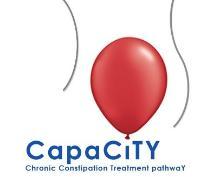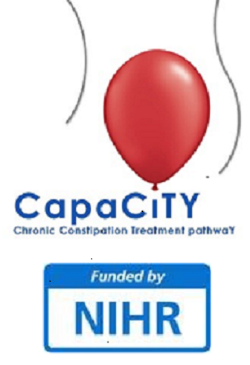Some degree of constipation affects nearly everyone at some stage in their life. However, some people suffer chronic symptoms that seriously impair their quality of life and which require medical intervention. Chronic constipation describes patients who have a longer duration of symptoms (more than 6 months) and who fail to respond to basic measures e.g. exercise, increased fluid intake, simple diet changes and laxatives. This problem may affect about 1 in 10 people, especially women, with about 1 in 50 people seeking specialist hospital management. Chronic constipation can be remarkably difficult to treat effectively, even in specialist units, resulting in a significant and sometimes severe impact on quality of life. Current approaches include laxatives and newer drugs, specialist-led bowel retraining programmes, anal irrigation therapy, and a variety of surgical operations that may have variable, and sometimes very poor, results. While there is current optimism that the situation for such patients will improve with several new treatments being developed, there is a lack of evidence about which treatments should be offered to patients and when, and practice varies widely between centres. Further, the value of expensive and invasive specialist investigations which may help to understand the underlying cause of the constipation is also unclear. In a resource-constrained NHS, doctors and patients need to have confidence that new and sometimes expensive therapies are cost-effective and that the old ones actually work.
The aim of this programme of research is to recruit a large number of adult patients (about 800) with chronic constipation from at least 10 centres in England over 5 years.
The programme of research is made up of three important clinical trials of non-drug therapies, all aiming to reduce the symptoms of chronic constipation in adults.
CapaCiTY01: The first trial is comparing the effectiveness of two types of specialist-led bowel retraining, habit training and biofeedback.
CapaCiTY02: The second trial is comparing the effectiveness of high volume and low volume anal irrigation.
CapaCiTY03: The third trial is investigating the efficacy of laparoscopic ventral mesh rectopexy, a type of surgery for correcting internal rectal prolapse.
Patients can take part in just one of the trials depending on their previous treatment or proceed through the trials in a stepwise fashion: i.e. if a patient fails to respond to one treatment they will move onto the next one. For each treatment, we will collect detailed data on the effectiveness of reducing symptoms of constipation, improvements in quality of life, patient acceptability and cost of treatment to the NHS. We will also determine the value of particular specialist investigations in being able to successfully guide treatment. Subsequently, we will synthesise our new evidence and published research findings to develop a guidance document for the NHS, which can be used nationally as a treatment pathway to provide effective care to patients in a timely fashion
Design and Methods
Recruitment:
Patients attending specialist centres (outpatient clinics; GI physiology units) for constipation will be eligible for recruitment and assessed against the eligibility criteria.
General Eligibility
Inclusion Criteria
- Age 18-70 years
- Patient self-reports problematic constipation
- Symptom onset > 6 months prior to recruitment
- Unsatisfactory defaecation characterized by infrequent stool, difficult stool passage or both for at least previous 3 months
- Constipation failed to respond to basic standard treatment. Minimum of lifestyle AND dietary measures AND ≥2 laxatives or prokinetics tried
- Ability to understand written and spoken English
- Ability and willingness to give informed consent
Exclusion Criteria
The study interventions necessitate the exclusion of major causes of secondary constipation. Briefly:
- Significant organic colonic disease
- Major colorectal resectional surgery
- Current overt pelvic organ prolapse or disease requiring obvious surgical intervention
- Previous pelvic floor surgery to address defaecatory problems
- Rectal impaction
- Significant neurological disease deemed to be causative
- Significant connective tissue disease
- Significant medical comorbidities and activity of daily living impairment [based on Bartell index in apparently frail patients Barthel index <=11]
- Major active psychiatric diagnosis
- Chronic regular opioid
- Pregnancy or intention to become pregnant during study period
- Previous exposure to the intervention being studied
Note: Each study may have additional criteria of relevance.
Design Summary
CapaCiTY01
394 eligible patients will be randomly allocated to 3 treatment groups.
Treatment Groups:
1. Habit training (147 patients)
2. Habit training with biofeedback (147 patients)
3. INVEST (100 patients). The INVEST patients will undergo specialist radio-physiological investigations. Based on their results, they will receive habit training with or without biofeedback.
Each group will undergo 3-4 treatment sessions over a 3-4 month period. Treatment will be tailored to individual requirements. Patients will then have follow-up assessments at 3, 6 and 12 months after treatment.
Trial Duration:
30 months recruitment period, 12 months follow up
Anticipated Start Date: November 2014
End Date: 30th June 2018
CapaCiTY02
300 eligible patients will be recruited and randomly allocated to 2 groups.
Treatment Groups:
1. Low Volume Anal Irrigation (150 patients)
2. High Volume Anal Irrigation (150 patients)
Participants will be trained in using the irrigation device over 2-3 sessions. Irrigation treatment will be self delivered for the duration of the study (12 months).
Follow up assessments at 1, 3, 6 and 12 months after randomisation
Trial Duration: 27 months recruitment, 10 months follow up
Anticipated Start Date: August 2015
End Date: 30th June 2018
CapaCiTY03
114 eligible patients will be recruited and randomly allocated to 3 groups. All 3 groups will receive Laprascopic Ventral Mesh Rectopexy, surgery to correct rectal prolapse & obstruction. They will be randomly allocated to different waiting times for surgery so those waiting for surgery become the control group for those who have had surgery. All groups have a run in period of 4 weeks to arrange surgery. The average waiting time is 3 months.
Treatment Groups:
1. (T= 0 weeks) Laprascopic Ventral Mesh Rectopexy (38) patients)
2. (T= 12 weeks) Laprascopic Ventral Mesh Rectopexy (38) patients)
3. (T= 24 weeks) Laprascopic Ventral Mesh Rectopexy (38) patients)
Follow up assessments every 12 weeks after randomisation intervals. A total of 8 assessments.
Trial Duration: 30 months recruitment, 10 months follow up
Anticipated Start Date: January 2015
Anticipated End Date: 30th June 2019
Standardised Outcome Framework
At the beginning of the study and each follow up assessment, a variety of validated questionnaires, patient diaries and qualitative interviews will be used to assess changes in symptom scores, quality of life, acceptability and cost effectiveness of treatments. This will establish the effectiveness of these therapies and the value of extensive investigation.
Detailed Design and Methodology:
Please select the link below for the detailed methodology of each study as detailed on the public registry ISRCTN.
CapaCiTY01: Randomised trial of habit training vs. habit training with direct visual biofeedback in adults with chronic constipation
CapaCiTY02: Pragmatic randomised trial of low versus high volume initiated transanal irrigation therapy in adults with chronic constipation
CapaCiTY03: Stepped wedge randomisation trial of laparoscipic ventral mesh rectopexy in adults with chronic contipation

Are you aged 18-70 years?
Do you pass stool less often than you would like or have difficulty passing stool?
Have you had symptoms of constipation for more than 6 months?
Have you previously tried to change your diet and lifestyle to manage your constipation?
Have you tried at least 2 types of medication like laxatives to relieve your constipation?
If you answered YES to all of the above, you may be suitable to take part in a study aiming to find the best treatments for chronic constipation sufferers.
If you would like to find out more, please read the patient information sheet
- CapaCiTY01 - Chronic Constipation Treatment pathwaY study 1 is a study comparing habit training and direct visual biofeedback, two specialist treatments for chronic constipation in adults.
Click Here for the CapaCiTY01 Patient Information Sheet
- CapaCiTY02 - Chronic Constipation Treatment pathway study 2 is a study comparing low volume versus high volume anal irrigation therapy for the treatment of adults with chronic constipation.
Click here for the CapaCiTY02 Patient Information Sheet
- CapaCiTY03 - Chronic Constipation Treatment pathway study 3 is a waiting list controlled trial of surgical treatment for adults with chronic constipation
Click here for the CapaCiTY03 Patient Information Sheet
To find out your nearest participating Trust, please visit the Recruiting Centres tab or 
Contact the Coordinating Centre:
National Centre for Bowel Research and Surgical Innovation
Queen Mary University of London
Tel: 0207 882 8753/8751

- Barts Health NHS Trust
- County Durham and Darlington NHS Foundation Trust
- Guy’s and Thomas’ NHS Foundation Trust London
- Newcastle Upon Tyne
- North Bristol NHS Foundation Trust
- Poole Hospital NHS Foundation Trust
- Sandwell and West Birmingham NHS Trust
- Sheffield Teaching Hospital NHS Foundation Trust
- St James University Hospital, Leeds Teaching Hospital
- St Marks Hospital at The North West Hospitals NHS Trust
- Royal Shrewsbury, The Shrewsbury and Telford Hospital NHS Foundation Trust
- University College Hospitals NHS Foundation Trust London
- University Hospital of South Manchester NHS Foundation Trust
- University Hospital Southampton NHS Foundation Trust
Note: Not all sites are recruiting to all studies, for more information contact the national centre.
Patient and Public Involvement Group
There are other ways you can be involved in research without having to take part in a clinical trial. The National Bowel Research Centre works closely with the Bowel and Cancer Research Charity on various research initiatives, including a patient and public involvement programme.
More information, including information on how you can be PaRT of it can be found here:
Bowel and Cancer Research Charity
National Bowel Research Centre
Research Environment and Team Expertise
The research team comprises leading UK clinicians in bowel management (gastroenterology, surgery, colorectal nursing, radiology, physiology, psychology and urogynaecology) together with broad methodological expertise. The clinical trials will be managed by the Barts and the London Pragmatic Clinical Trials Unit Queen Mary, University of London.
Chief Investigator
Professor Charles Knowles, Clinical Professor & Hon. Consultant Colorectal Surgeon, National Bowel Research Centre, Centre for Neuroscience and Trauma, Queen Mary, University of London
Co-Investigators
- Professor Christine Norton, Professor of Nursing, Imperial College Healthcare, NHS Trust
- Professor Yan Yiannakou, Consultant Physician / Gastroenterology. University of Durham
- Professor James Mason, Professor of Health Economics, School of Medicine, Pharmacy & Health, University of Durham
- Professor Sandra Eldridge, Professor of Biostatistics, Centre for Primary Care and Public Health Queen Mary, University of London
- Dr S. Mark Scott, Senior Clinical Scientist, Centre for Digestive Diseases (Academic Surgical Unit) Queen Mary, University of London
- Ms Deborah Gilbert, Chief Executive, Bowel and Cancer Research Charity
- Mrs Louisa Smalley, Patient and Public Involvement representative, Director Chuckles UK
- Mrs Janet Sedgwick, Associate Chief Operating Officer, County Durham and Darlington NHS Foundation Trust
- Professor Linda Cardozo, Professor of Urogynaecology, King's College London
- Professor Rona Moss-Morris, Professor of Psychology as Applied to Medicine, King's College London
- Professor Stuart Taylor, Professor of Medical Imaging, University College London
- Dr Anton Emmanuel, Senior Lecturer in Gastroenterology, University College London Hospitals NHS Foundation Trust
- Miss Carolynne Vaizey, Chair of Surgery and Consultant Surgeon, Northwest NHS
Research Staff
-
Shiva Taheri, Programme Manager, National Bowel Research Centre, Queen Mary, University of London
- Tatenda Marunda, Senior Research Nurse, National Bowel Centre Research Centre, Queen Mary, University of London
-
Shelley Wood, Research Nurse, University of Durham
-
Kolsuma Begam, Data Administrator, National Bowel Research Centre, Queen Mary, University of London
- Amina Mirre, Clinical Trials Data Assistant, National Bowel Research Centre, Queen Mary, University of London
Previous Staff
- Natasha Stevens, Senior Research Programme Manager, National Bowel Research Centre, Queen Mary, Universirty of London
- Dr Ugo Grossi, Clinical Research Fellow, National Bowel Research Centre, Queen Mary, University of London
- Dr Chris Emmett, Clinical Research Fellow, University of Durham
For all enquiries, please contact the Coordinating Centre:
Shiva Taheri
Clinical Research Coordinator
National Bowel Research Centre
Queen Mary, University of London
s.taheri@qmul.ac.uk



